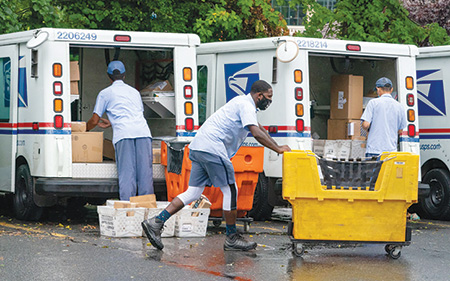Letter Carriers union files grievance against slowdown scheme
By TIM ROWDEN
Managing Editor

President Donald Trump recently admitted his attacks on the United States Postal Service (USPS) are nothing short of intentional, telling Fox News that he was against funding the USPS because, “They need that money in order to make the Post Office work so it can take all of these millions and millions of ballots.”
Speaking at his daily pandemic news briefing on Aug. 12, Trump said he would not approve $25 billion in emergency funding for the Postal Service, nor $3.5 billion in supplemental funding for election resources.
“They need that money in order to make the post office work so it can take all of these millions and millions of ballots,” Trump said. “But if they don’t get those two items, that means you can’t have universal mail-in voting.”
America is watching an attempt to steal the November election in real time.
Trump’s attacks on the Postal Service and attempt to undermine mail-in voting in the midst of a global pandemic and national public health crisis are nothing new. This drama has been unfolding for months..
Democrats included $25 billion to help the USPS in their coronavirus relief proposal in May, but Trump and Senate Republicans have balked at providing additional funding. Democrats have accused Trump and new Postmaster General Louis DeJoy of trying to “sabotage” the mail service ahead of an expected surge in mail voting in November’s election — and now Trump has confirmed that.
LETTER CARRIERS FILE GRIEVANCE
The National Association of Letter Carriers (NALC) has filed a national grievance against Trump-appointed DeJoy, a top donor to Trump and the Republican Party, who took over the agency in June and ordered a series of policy changes — banning overtime, telling carriers to leave mail behind at distribution centers, and removing sorting equipment used to speed mail processing.
 In its formal filing, NALC President Fredric Rolando wrote, “the Postal Service’s unilateral implementation of the delivery initiative test called Expedited Street/Afternoon Sortation (ESAS)… raises the same fundamental issue NALC raised in previous national level disputes: Whether the Postal Service may suspend compliance with the National Agreement (the contract) or applicable regulations under the guise of conducting a ‘test.’ It remains our position that management may not unilaterally implement tests which are inconsistent with regulations outlined in handbooks and manuals without first reaching an agreement with the union.
In its formal filing, NALC President Fredric Rolando wrote, “the Postal Service’s unilateral implementation of the delivery initiative test called Expedited Street/Afternoon Sortation (ESAS)… raises the same fundamental issue NALC raised in previous national level disputes: Whether the Postal Service may suspend compliance with the National Agreement (the contract) or applicable regulations under the guise of conducting a ‘test.’ It remains our position that management may not unilaterally implement tests which are inconsistent with regulations outlined in handbooks and manuals without first reaching an agreement with the union.
“These changes directly impact terms and conditions of employment of city letter carriers” and violate the USPS contract with the 200,000-member union, Rolando said.
REMOVING SORTING MACHINES
Kimberly Karol, a postal clerk and head of the Iowa Postal Workers Union, told NPR, “In Iowa, we are losing machines. That also hinders our ability to process mail in the way that we had in the past.”
 Karol said DeJoy’s changes have alarmed postal workers “all across the country.”
Karol said DeJoy’s changes have alarmed postal workers “all across the country.”
“His policies — although they’ve only been in place for a few weeks — are now affecting the way that we do business and not allowing us to deliver every piece every day as we’ve done in the past,” she said.
“I don’t see this as cost-saving measures. I see this (as an effort) to undermine the public confidence in the mail service,” she said. “It’s not saving us. We are spending more time trying to implement changes, and in our office, it’s costing more overtime.”
 Mark Dimondstein, president of the American Postal Workers Union (APWU), says the delays caused by DeJoy’s changes could prevent people from successfully voting this fall.
Mark Dimondstein, president of the American Postal Workers Union (APWU), says the delays caused by DeJoy’s changes could prevent people from successfully voting this fall.
Nonpartisan analysts estimate three-fourths of people in the U.S. are eligible to vote by mail on or before the Nov. 3 election. But voting by mail assumes USPS delivers ballots to voters on time and that it postmarks returned ballots on or before Election Day. DeJoy’s delays throw both propositions into doubt, Dimondstein says.
LAWMAKERS DENOUNCE CHANGES
Lawmakers from both parties have denounced the changes.
Speaker of the House Nancy Pelosi (D-Calif.) and Senate Minority Leader Chuck Schumer (D-N.Y.) wrote to DeJoy, saying, “We believe these changes, made during the middle of a once-in-a-century pandemic, now threaten the timely delivery of mail — including medicines for seniors, paychecks for workers and absentee ballots for voters — that is essential to millions of Americans.”
Democrats have called on the USPS inspector general’s office to review changes. Sen. Gary Peters (D-Mich.), the top Democrat on the committee that oversees the postal service, has launched a probe.
Rep. Gerry Connolly (D-Va.) chair of a House subcommittee that deals with postal service legislation, tweeted that DeJoy’s slowdown scheme “is absolutely an attempt to interfere with the (November) election.”
“One way to suppress (mail-in) votes is to slow down delivery of the mail,” Connolly tweeted.
The House Oversight Committee has called DeJoy to testify on the changes on Sept. 17.
(Information from the Washington Post, Slate, NPR, Press Associations Union News Service, the National Association of Letter Carriers and the American Postal Workers Union.)
r />


